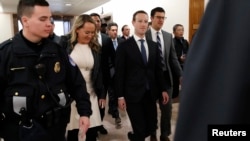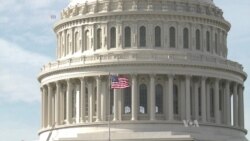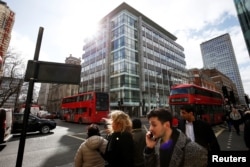Facebook CEO Mark Zuckerberg is set to testify publicly Tuesday before a group of U.S. senators after apologizing for the way his company handled data for millions of users.
He is due to appear before a joint hearing of the Senate Judiciary Committee and Senate Commerce Committee, and on Wednesday will go before House lawmakers.
Judiciary Committee Chairman Chuck Grassley said users "deserve to know how their information is shared and secure," and that he wants to explore with Zuckerberg ways to balance safety with innovation.
Zuckerberg met privately with lawmakers in Washington on Monday and released written testimony saying the social media network should have done more to prevent itself and the data of its members from being misused.
"We didn't take a broad enough view of our responsibility, and that was a big mistake. It was my mistake, and I'm sorry," Zuckerberg said.Zuckerberg was called to testify after news broke last month that personal data of millions of Facebook users had been harvested without their knowledge by Cambridge Analytica, a British voter profiling company that U.S. President Donald Trump’s campaign hired to target likely supporters in 2016.
WATCH: Video report on Facebook Data Breach
Cambridge Analytica connection
Prior to 2016, Facebook allowed a British researcher to create an app on Facebook on which about 200,000 users divulged personal information that was subsequently shared with Cambridge Analytica. The number of affected Facebook users multiplied exponentially because the app also collected data about friends, relatives and acquaintances of everyone who installed it.
Cambridge Analytica said it had data for 30 million of Facebook’s 2.2 billion users.
On Capitol Hill, U.S. lawmakers signaled they want action, not just contrition, from social media executives.
“If we don’t rein in the misuse of social media, none of us are going to have any privacy anymore,” the top Democrat on the Senate Commerce Committee, Bill Nelson of Florida, told reporters after meeting privately with Zuckerberg Monday.
Meanwhile, Facebook announced it is starting to notify tens of millions of users, most of them in the United States, whose personal data may have been harvested by Cambridge Analytica.
New cyber firewalls
The social media giant is also empowering all its users to shut off third-party access to their apps and is setting up cyber “firewalls” to ensure that users’ data is not unwittingly transmitted by others in their social network.
For years, Congress took a largely “hands-off” approach to regulating the internet. Some analysts believe that is about to change after the Facebook data breach, as well as a cascade of revelations about Russian cyber-meddling.
“At this point in time, it's really up to Congress and the federal agencies to step up and take some responsibility for protecting privacy, for regulating Facebook as a commercial service which it clearly is,” Marc Rotenberg, president of the Washington-based Electronic Privacy Information Center, told VOA. “We’ve gone for many years in the United States believing that self-regulation could work — that Facebook and the other tech giants could police themselves, but I think very few people still believe that.”







